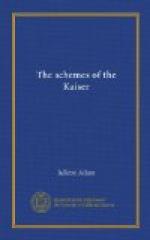The challenges that men fling at the ideal structure of the principles of humanity are like the stones that children throw at monuments. They accumulate and serve to consolidate that which they were meant to destroy.
No one can reproach William II with inactivity, and in this the monarch at Berlin is of one mind with Germany. He draws the nation after him; it follows blindly on dizzy paths of adventure and the pursuit of wealth.
There is this about Germany to inspire us with fear—and one wonders how it is that Russia and France have not been so terrified long ago as to make them leave no stone unturned in the Near and Far East, to exorcise the perils with which her earth-hunger threatens them—that she is just as greedy as England in the politics of business, has just the same jealous desires for financial and commercial expansion, but that, in addition, she has hankerings of another sort: for glory, for conquests, for the annexations necessary to feed and satisfy her imperious military spirit. When we consider the innumerable objects for which Germany is working in the Near and Far East, we are compelled to astonishment at the narrow limits of the field of action that she leaves for other nations.
Prior to 1870, every country in Europe possessed its own distinguishing features, its power, its ambition, or its dominating influences. England was the first, of commercial and industrial nations. Russia was the great leader of Oriental policy, the predestined heir to Asia. Austria was the supreme German power. France was a military nation and at the same time the eldest daughter of the Church; she was the undisputed protector of Catholic Missions all over the world and umpire in most of the great international quarrels. To-day, Germany is at once all that England, Russia, Austria and France were. She holds every monopoly, centralises power of every kind, and destroys all power of movement in others. When shall we have a determined coalition against Germany? Herein lies the only hope of liberating Europe from the claws of Prussia and recovering something of the lion’s share which William takes to himself.




